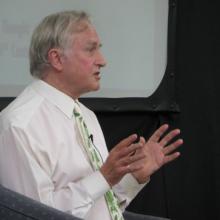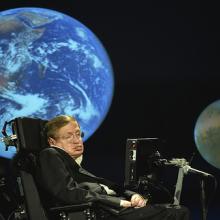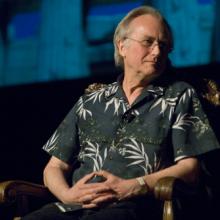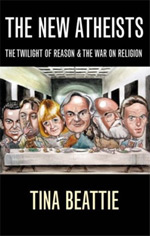Richard Dawkins
Preliminary police reports describe a long-simmering dispute over parking as the motive for the killings of three Muslim students at a Chapel Hill condominium Feb. 10.
But many Muslims in the Raleigh-Durham community and beyond are not so sure. The triple murders in this usually harmonious university town immediately took on a larger narrative of hate crimes against Muslims and charges of atheists baiting Muslims.
On Wednesday, police charged Craig Stephen Hicks, 46, of Chapel Hill with three counts of first-degree murder.
They allege he shot Deah Shaddy Barakat, 23, and his wife, Yusor Mohammad Abu-Salha, 21, and Abu-Salha’s sister, Razan Mohammad Abu-Salha, 19, of Raleigh inside their condominium near the University of North Carolina campus in Chapel Hill.
As the world’s most famous atheist, Richard Dawkins is no stranger to criticism from religious believers.
But in recent months, a few of his opinions have riled many in the atheist community as well. Remarks he made on Twitter and elsewhere on subjects ranging from sexual harassment (“stop whining”) to Down syndrome fetuses (“abort and try again”) have sparked suggestions from some fellow nonbelievers that he would serve atheism better by keeping quiet.
When asked about his controversial July tweets on pedophilia — Dawkins opined that some attacks on children are “worse” than others — the 73-year-old British evolutionary biologist and best-selling New York Times author declined to be interviewed.
But on a speaking tour through the San Francisco Bay Area in support of his new memoir, “An Appetite for Wonder,” he invited a reporter to sit down with him and explore the thinking behind his remarks.
Bottom line: He stands by everything he has said — including comments that one form of rape or pedophilia is “worse” than another, and that a drunken woman who is raped might be responsible for her fate.
A new coalition of atheists, humanists and other nonreligious groups is taking a page from the gay rights movement and encouraging people to admit they are “openly secular.”
The coalition — unprecedented in its scope — is broadening a trend of reaching out to religious people and religious groups by making the secular label a catchall for people who are not religious.
“We wanted to rise above who is an atheist, who is an agnostic, who is a humanist, who is a secular Jew,” said Todd Stiefel, founder of the Stiefel Freethought Foundation and a main force behind the coalition. “This needed to be about something everyone could rally behind so we intentionally used the word secular because it was one thing we could all agree on.”
The campaign, “Openly Secular: Opening Minds, Changing Hearts,” was unveiled at the 65th annual gathering of the Religion Newswriters Association here on Sept. 20. It includes a website, resources for families, employers and clergy, and a YouTube channel featuring both prominent and rank-and-file nonbelievers announcing their names followed by the declaration, “I am openly secular.”
It was 2006’s “The God Delusion” that many credit with sparking a growing interest in atheism in the U.S. Along with best-selling books by the other members of the “Four Horsemen” of atheism—the late Christopher Hitchens, Sam Harris, and Daniel Dennett—Dawkins’ rising star mirrored the growth of atheism in the last decade.
In 2012, the Pew Research Center found 5.7 percent of Americans identified as either atheists or agnostics, up from 3.7 percent in 2007.
“Richard Dawkins has done a lot to bring atheism to a whole new generation,” said Phil Zuckerman, a sociology professor who studies atheism and who also credits Dawkins with speaking out against the pedophilia scandal within the Catholic Church. “On the other hand, Dawkins seems to embody everything that people dislike about atheists: He is smug, condescending and emits an unpleasant disdainfulness. He doesn’t ever seem to acknowledge the good aspects of religion, only the bad. In that sense, I think he doesn’t help atheism in the PR department.”
One of Dawkins’ biggest missteps came in 2011, when he blasted Rebecca Watson, a young atheist activist who wrote about feeling sexually harassed at a freethought conference. In a now infamous series of comments posted to the blog Pharyngula, Dawkins wrote in a message titled “Dear Muslima,” “Stop whining, will you? ... For goodness sake grow up, or at least grow a thicker skin.”
Renowned scientist and author of such books as A Brief History of Time, Stephen Hawking suggested recently that it is conceivable in the future that we may be able to upload the contents of the human brain onto a computer so that the information may, in a sense, become immortalized. He readily conceded, however, that such a task was well beyond our current technological capacity, and he offered some measured words of caution for those who sought to read too much into this potential.
When asked if this meant that there was potential for the mind to live forever through an alternative medium, he was dismissive. Such talk of human immortality, he said (and in particular, the very notion of heaven), was the stuff of fairy tales for people “afraid of the dark.”
Then in the same week, TIME Magazine featured a story about Google on its cover, highlighting a new company it has recently launched called Calico. The new enterprise is perhaps the most ambitious of what Google commonly calls their “moonshot” projects, as its aim is to prolong the human lifespan potential, and perhaps eventually solve the “problem” of death.
All of this was particularly interesting to me in the context of the conversation between Richard Dawkins and Jon Stewart on a recent episode of The Daily Show about whether science or religion was more responsible for hastening humanities apparent self-destruction.
First things first: with all due respect to interim host John Oliver, I for one am thrilled to have Jon Stewart back on The Daily Show. I know it is sad to say, but I actually missed him while he was on summer hiatus. Welcome back, little buddy!
Last night, Stewart interviewed Richard Dawkins, author of The God Delusion, who was promoting his newest title, An Appetite for Wonder. The most interesting moments in the interview revolved around Stewart’s question to Dawkins about whether science or religion ultimately would be responsible for hastening our journey down this path of apparent self-annihilation. What followed was a fascinating, if not entirely satisfying, dialogue about the “downsides” of both disciplines.
Richard Dawkins, one of the world’s best-known and outspoken atheists, has provoked outrage among child protection agencies and experts after suggesting that recent child abuse scandals have been overblown.
In an interview in The Times magazine on Saturday, Dawkins, 72, he said he was unable to condemn what he called “the mild pedophilia” he experienced at an English school when he was a child in the 1950s.
Referring to his early days at a boarding school in Salisbury, he recalled how one of the (unnamed) masters “pulled me on his knee and put his hand inside my shorts.”
He said other children in his school peer group had been molested by the same teacher but concluded: “I don’t think he did any of us lasting harm.”
Religiosity is on the decline in the U.S. and atheism is on the rise, according to a new worldwide poll.
The poll, called “The Global Index of Religiosity and Atheism,” found that the number of Americans who say they are "religious" dropped from 73 percent in 2005 (the last time the poll was conducted) to 60 percent.
At the same time, the number of Americans who say they are atheists rose, from 1 percent to 5 percent.
The poll was conducted by WIN-Gallup International and is based on interviews with 50,000 people from 57 countries and five continents. Participants were asked, “Irrespective of whether you attend a place of worship or not, would you say you are a religious person, not a religious person, or a convinced atheist?”
The seven years between the polls is notable because 2005 saw the publication of The End of Faith by Sam Harris, the first in a wave of best-selling books on atheism by Christopher Hitchens, Richard Dawkins, Daniel Dennett and other so-called “New Atheists.”
LONDON — A controversial Oxford University professor billed by many as the world's "most famous atheist" now says he is not 100 percent sure that God doesn't exist — but just barely.
In a 100-minute debate with Archbishop of Canterbury Rowan Williams last week, Richard Dawkins surprised his online and theater audiences by conceding a personal chink of doubt about his conviction that there is no such thing as a creator.
But, to the amusement of the archbishop and others, the evolutionary biologist swiftly added that he was "6.9 out of seven" certain of his long-standing atheist beliefs.








 Following is a continuation of Becky Garrison's e-mail exchange with Tina Beattie, author of
Following is a continuation of Becky Garrison's e-mail exchange with Tina Beattie, author of